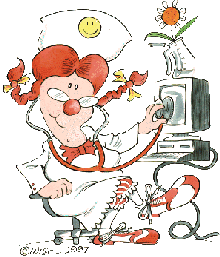
Patty Wooten presents ... 
Introduction
[to Patty's JNJ column]
From Journal of Nursing Jocularity, Spring 1991, 1(1), pp 46-47.
|
I am a critical care nurse and a professional clown. For the last twenty years I've worked in a variety of ICUs from large medical centers to small community hospitals. I've had the opportunity to observe how humor can be used effectively with patients and coworkers. About seven years ago I began to take humor seriously and studied how it was utilized formally in the health care setting. For the last five years I've presented my workshop to over 20,000 nurses throughout the United States. The workshop explores the power, potential, and practicality of humor therapy. Many nurses have shared how essential humor and laughter are for them to cope with the stress of caregiving. The Journal of Nursing Jocularity was created to provide us with an opportunity to laugh at ourselves, our problems and frustrations and to experience the benefits that laughter and humor can give us.
Laughter can be a powerful therapy for both the patient and the caregiver. The ability to laugh at a situation or problem gives us a feeling of superiority and power. Humor and laughter can foster a positive and hopeful attitude. We are less likely to succumb to feelings of depression and helplessness if we can laugh at what is troubling us. Humor gives us a sense of perspective on our problems; and laughter provides an opportunity for the release of uncomfortable emotions that, if held inside, may create biochemical changes that are harmful to the body.
Health professionals working in a stress-filled environment are at risk for burnout and stress-related illness. Our ability to see the humor in a situation and to laugh freely with our coworkers can be an effective way to take care of our body, mind and spirit. For thousands of years, the human race has extolled the health- enhancing benefits of laughter. Current research in the areas of psychology, physiology, and psychoneuroimmunology is defining the specific changes effected by the experience of mirthful laughter.
Twenty-five years ago, Norman Cousins used the positive emotions of faith, hope, laughter and joy to counteract the effects of a stressful lifestyle that he believed had led to his illness. He viewed humorous films several times each day to create opportunities for laughter and subsequently recovered from ankylosing spondylitis. His experience aroused the curiosity of the medical community and he was invited to teach at UCLA Medical Center. He has coordinated the research efforts of scientists across the US and has recently published a summary of their findings in his book Head First: The Biology of Hope. It is well worth reading. To create positive emotions and the healing atmosphere that Mr. Cousins has researched, many hospitals have created humor rooms and carts. Others have installed cable TV comedy channels, and some even employ clowns to make rounds each day.
|
|
|
|
|
This article was originally published in "Jest for the Health of It", a regular feature in the Journal of Nursing Jocularity.
Feature columnist Patty Wooten, BSN, is also a past President of the American Association for Therapeutic Humor, author of two books related to humor, and a national speaker presenting on the benefits of humor.
